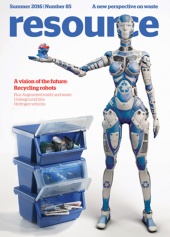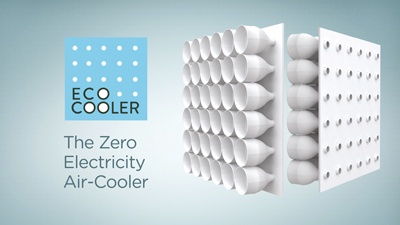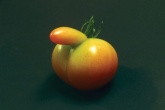Off the wall: Summer 2016
A round-up of some of the more unusual stories coming out of the waste and resources world...
Are you a caffeine-addicted fashionista wondering how to combine your loves of fashion and coffee? Spanish company Ecoalf has just the thing: clothing made from used coffee grounds.
The manufacturing process involves drying out and removing traces of oil from wet coffee grounds, which are then ground down and combined with recycled polyester polymers. The resulting yarn is spun into a fabric for uses such as outer shells, as it is water resistant and has odour control properties.
The fabric also wicks water away, keeps you cool and offers UV protection. It’s a shame the range is only usually available in autumn and winter as it could prove very useful during the British summer!


The message of the 3Rs – reduce, reuse, recycle – must be drummed into people, and that’s exactly what Bangalore-based drummer Montry Manuel has decided to do by trading in his expensive instruments for some more ‘socially and environmentally conscious’ ones.
His Thaalavattam project aims to ‘clean the environment through music’ by using instruments made from plastic and metal waste found in Indian dumps, including jugs, buckets, waste PVC pipes and paint or drinks cans.
He now wants to make hundreds more instruments, which mimic the sound of traditional instruments, to help clean up waste in India and encourage creative recycling. So if your plastic waste is building up, why not recycle the Montry Manuel way and bang out some tunes!
Most motor tyres are produced using natural latex from the rubber tree, but the Continental tyre company is now testing a tread made from dandelion roots.
Unlike rubber trees, which are a bit fussy about where they like to grow and are energy intensive to harvest, dandelions can be grown in poor-quality soil and in cold climates. It also only takes a year to harvest dandelions whereas rubber trees take seven years before they produce latex (yawn!).
 This article was taken from Issue 85
This article was taken from Issue 85Dandelion-derived tyres would therefore have a reduced carbon footprint and could be a more sustainable alternative to traditional tyres. Unfortunately for the weed-haters out there, only a specific Russian species of Dandelion can produce the desired latex, so no need to dig up your gardens!

There aren’t many obvious health benefits to drinking fizzy drinks, but a designer in Bangladesh has just found one. Zero electricity air conditioners, made from empty plastic drinks bottles, are being installed in huts in rural Bangladesh where interior temperatures can hit up to 45 degrees Celsius.
The Eco-cooler can be made by inserting the top half of bottles into a grid of holes in a window-sized wooden board. The bottles act as funnels which channel passing wind inside and can reduce interior temperatures by as much as five degrees.
By making the design widely available at no cost in a country where few could afford an electrical alternative, developers The Grey Group are certainly making recycling cool!












